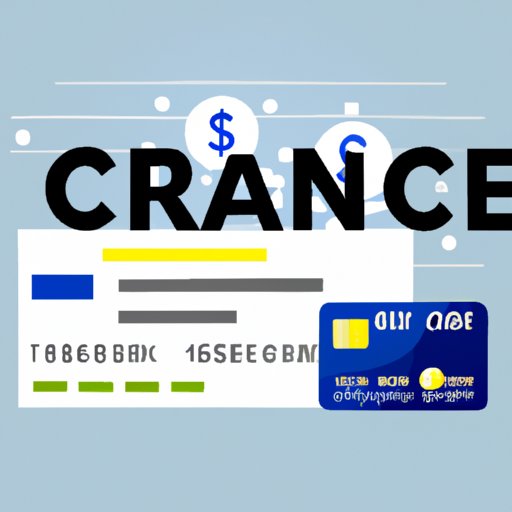Introduction
When it comes to borrowing money or using a credit card, understanding what a finance charge means is essential. A finance charge is a fee that is added to the cost of a loan or credit card purchase, and it can have a significant effect on the total amount owed. In this article, we will explore what a finance charge is, how to calculate and avoid it, and the different ways it can affect your credit score.

How to Calculate and Avoid Finance Charges
The most important thing to understand about finance charges is how they are calculated. The amount of the finance charge is based on the interest rate associated with the loan or credit card purchase. Interest rates vary depending on the lender or credit card company, but they typically range from 10-30%. To calculate the finance charge, you must multiply the interest rate by the total amount borrowed or charged.
In addition to interest rates, there may be other fees and costs associated with a loan or credit card purchase. These can include annual fees, late payment fees, over-the-limit fees, and more. Understanding these additional fees and costs can help you avoid unexpected finance charges.
There are also several strategies you can use to avoid finance charges altogether. Paying off your balance in full each month is one of the best ways to do this. You can also take advantage of promotional offers such as 0% APR periods and balance transfer deals. Finally, using a rewards credit card can help you earn points or cash back that can make up for any finance charges incurred.
What Types of Transactions Incur Finance Charges
Finance charges can be applied to a variety of transactions, including credit card purchases, cash advances, and balance transfers. Credit card purchases typically incur interest charges when you don’t pay off the balance in full each month. Cash advances are loans taken out against your credit card limit, and they often come with higher interest rates and additional fees. Balance transfers involve moving debt from one credit card to another, and they usually come with a one-time fee.

The Impact of Finance Charges on Credit Scores
Finance charges can have a significant impact on your credit score. One of the key factors in determining your credit score is your credit utilization ratio, which is the amount of credit you’re using compared to your available credit limit. If your credit utilization ratio is too high, it can drag down your credit score. High finance charges can also lead to late payments, which can have a negative impact on your credit score.
It’s important to note that not all finance charges are bad. For example, if you pay off your balance in full each month, you won’t be charged interest and your credit score won’t be affected. However, if you carry a balance and incur finance charges, your credit score may suffer.
The Difference Between Interest and Finance Charges
Interest and finance charges are often used interchangeably, but they are actually two different things. Interest refers to the cost of borrowing money, while finance charges include any additional fees or costs associated with a loan or credit card purchase. For example, an interest rate of 20% might include a finance charge of 5%, which would increase the total cost of the loan.
Interest and finance charges each have their own benefits and drawbacks. Interest charges are typically lower than finance charges, but they can still add up over time. On the other hand, finance charges are often higher but may include additional benefits such as flexible repayment options or rewards programs.

Understanding How Credit Card Companies Use Finance Charges
Credit card companies often use finance charges to make money. They typically use variable interest rates, which means the rate can change over time. They may also offer different pricing structures, such as introductory offers or tiered rates. These pricing structures can result in higher finance charges for certain purchases or balances.
Exploring Different Ways to Reduce or Eliminate Finance Charges
There are several ways you can reduce or eliminate finance charges. Negotiating a lower interest rate with your credit card company can be effective, as can transferring your balance to a card with a lower interest rate. Taking advantage of rewards programs can also help offset any finance charges you incur. Finally, paying off your balance early can help you avoid finance charges altogether.
Conclusion
Finance charges can have a significant impact on the cost of borrowing money or using a credit card. Understanding how to calculate and avoid finance charges, what types of transactions incur them, and the impact on credit scores can help you make informed decisions about your finances. Additionally, exploring different ways to reduce or eliminate finance charges can help you save money in the long run.
(Note: Is this article not meeting your expectations? Do you have knowledge or insights to share? Unlock new opportunities and expand your reach by joining our authors team. Click Registration to join us and share your expertise with our readers.)
